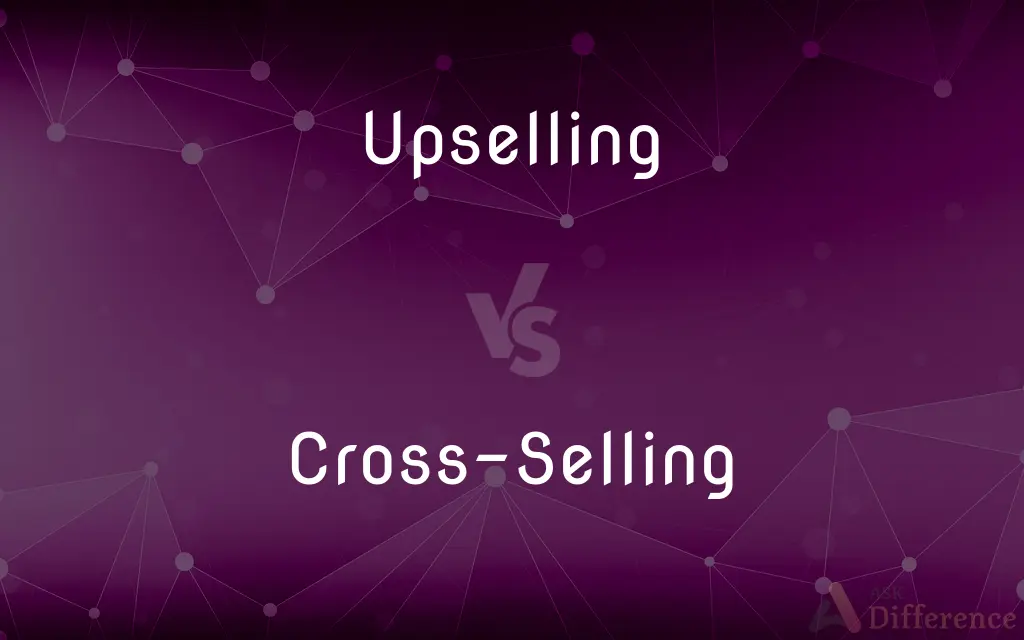Upselling vs. Cross-Selling — What's the Difference?
By Tayyaba Rehman — Published on December 23, 2023
Upselling involves offering a superior, often pricier, version of a product, while Cross-Selling recommends complementary items to a purchased product.

Difference Between Upselling and Cross-Selling
Table of Contents
ADVERTISEMENT
Key Differences
Upselling, as a sales strategy, focuses on encouraging customers to purchase a more expensive version of the item they're considering. On the other hand, Cross-Selling aims to suggest additional items that would complement the customer's current or intended purchase.
When implementing Upselling, the intent is to maximize the value of a single product for the buyer. In Cross-Selling, the goal is to diversify the products the buyer takes home, adding breadth to their shopping experience.
Imagine a customer buying a laptop. If the salesperson recommends a faster laptop with more storage, that's Upselling. If the salesperson suggests purchasing a mouse, keyboard, or protective case, that's Cross-Selling.
Another way to differentiate Upselling from Cross-Selling is by understanding their end goal. Upselling typically seeks to increase the average transaction amount. In contrast, Cross-Selling aims to increase the number of products a customer purchases.
The effectiveness of both Upselling and Cross-Selling depends on understanding customer needs. A good upsell feels like a valuable suggestion, while a successful cross-sell complements the buyer's original intent.
ADVERTISEMENT
Comparison Chart
Primary Objective
Upgrade a product
Add complementary products
Focus
Single product enhancement
Diversifying the purchase
Example
Buying a larger TV
Buying a DVD player with a TV
Sales Increase
Increases transaction amount
Increases number of items purchased
Customer Perception
Value enhancement
Completing or enhancing their purchase
Compare with Definitions
Upselling
Convincing customers to buy a more expensive version of an item.
She succeeded in Upselling the premium package to the client.
Cross-Selling
A strategy to offer complementary products.
By Cross-Selling batteries with toys, the store boosted its sales.
Upselling
Elevating the purchase by offering enhancements or upgrades.
Upselling the leather seats made the car's interior stand out.
Cross-Selling
Encouraging buyers to diversify their purchase.
Cross-Selling software with computers ensures users have what they need.
Upselling
A technique to increase the transaction value.
Upselling often leads to greater profit margins for businesses.
Cross-Selling
Enhancing the shopping experience by suggesting additions.
Cross-Selling wine glasses with wine bottles seemed intuitive.
Upselling
Suggesting superior products based on customer's choice.
The waiter was skilled at Upselling, recommending the steak over the chicken.
Cross-Selling
Expanding the customer's shopping list through recommendations.
The website was adept at Cross-Selling by showcasing related products.
Upselling
Guiding customers to pricier alternatives.
Through effective Upselling, he sold the latest model of the smartphone.
Cross-Selling
Recommending products related to the customer's purchase.
The team excelled at Cross-Selling, often suggesting shoes with dresses.
Upselling
The practice of offering customers additional or more expensive products or services after they have already agreed to buy something.
Cross-Selling
The selling of other products or services to an existing group of customers, often through a marketing agreement.
Upselling
Infl of upsell
Cross-Selling
Infl of cross-sell
Common Curiosities
What is the main goal of Upselling?
Upselling aims to encourage customers to buy a more expensive version or upgrade of their chosen product.
Is Upselling always about pricier options?
Primarily yes, Upselling usually guides customers to more expensive or enhanced choices.
Why do businesses use Cross-Selling?
Cross-Selling increases the number of products a customer buys, enhancing their shopping experience and boosting sales.
Can both Upselling and Cross-Selling be used simultaneously?
Yes, a business can use both strategies to maximize the value of a customer's purchase.
How is Cross-Selling different from Upselling?
While Upselling focuses on upgrades, Cross-Selling introduces complementary products to the customer.
Is Upselling only for tangible products?
No, Upselling can also be applied to services, such as premium support or faster delivery options.
Which is more effective: Upselling or Cross-Selling?
Both can be effective; the key is understanding the customer's needs and preferences.
In what scenarios is Cross-Selling most effective?
Cross-Selling works best when the suggested products genuinely complement the primary purchase.
How should one approach Cross-Selling without seeming intrusive?
Cross-Selling should be based on the customer's needs and should feel like a helpful suggestion rather than a sales pitch.
What's a common example of Upselling in the food industry?
Offering a larger size or premium ingredient, like "Would you like to upgrade to a large for $1 more?", is Upselling.
How does Upselling benefit the customer?
Upselling provides the customer with a product that may offer better features, longevity, or overall value.
Can Upselling and Cross-Selling strategies backfire?
Yes, if done insensitively or excessively, these strategies can deter customers and harm the brand's reputation.
Can Cross-Selling be seen as pushy?
If done excessively or without considering the customer's needs, Cross-Selling can come off as aggressive.
How do online platforms use Cross-Selling?
Online platforms often use "Customers also bought" or "Related products" sections for Cross-Selling.
Is Upselling only about increasing profits?
While Upselling can increase profits, it also aims to provide customers with better value or enhance their experience.
Share Your Discovery

Previous Comparison
Photoelectric Effect vs. Photovoltaic Effect
Next Comparison
Myelinated Nerve Fibers vs. Unmyelinated Nerve FibersAuthor Spotlight
Written by
Tayyaba RehmanTayyaba Rehman is a distinguished writer, currently serving as a primary contributor to askdifference.com. As a researcher in semantics and etymology, Tayyaba's passion for the complexity of languages and their distinctions has found a perfect home on the platform. Tayyaba delves into the intricacies of language, distinguishing between commonly confused words and phrases, thereby providing clarity for readers worldwide.












































